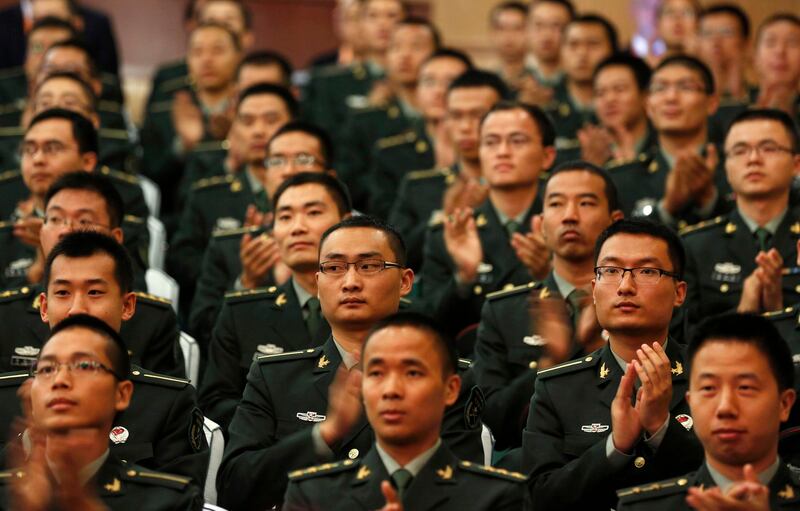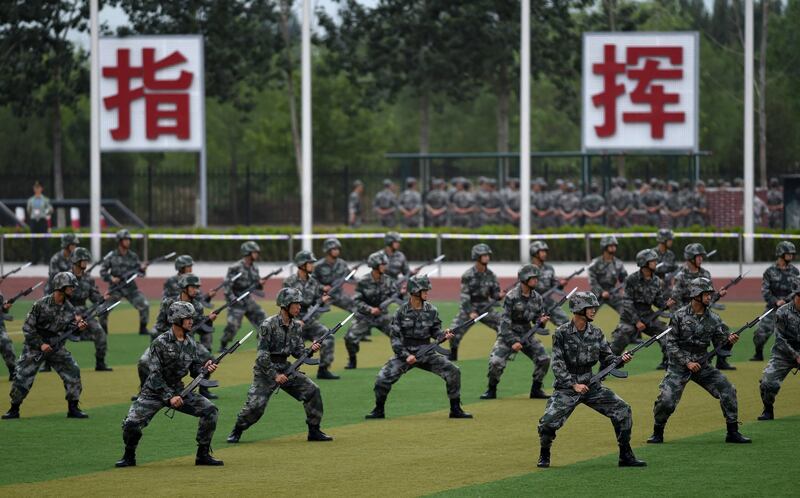China's military schools are stepping up their recruitment of recent high school graduates in a bid to upgrade the armed forces' capacity to wage high-tech warfare, according to the country's Ministry of Defense.
"We will be recruiting an extra 2,000 high school graduates this year, making a total intake of 17,000 ... for 2023," a training and education official from the ruling Communist Party's Central Military Commission said in a Q&A article posted on the ministry's website.
A total of 27 military schools will be recruiting, including 10 linked to the People's Liberation Army, five from the navy, four from the airforce and one from the rocket corps.
In addition, four People's Armed Police universities will be seeking fresh college-level recruits, along with two colleges training people for the Strategic Support Force, the space, cyber, political, and electronic warfare branch of the PLA, the official said.
"Choose a military academy and dedicate your youth without regrets," the article says. "For a drop of water to make waves, it has to pour itself into rivers, lakes and the ocean."
"Let your youthful dream become part of the torrent of a strong army."
Recruiting problems?
The move has prompted widespread speculation online that China's military schools are struggling to find recruits.
Two lengthy blog posts hosted on Sina.com and on Netease said military schools are slashing their minimum high school graduation – or gaokao – test scores, citing this year's minimum for male applicants in the western province of Qinghai as evidence.
"Has interest in military academies gone cold?" wrote one blogger, citing a slew of admission data relating to Inner Mongolia.

"Compared with the data of previous years, there is a downward trend across the board in minimum scores required by military academies this year," another blogger wrote on the Sohu.com platform, citing government figures that Radio Free Asia was unable to confirm.
The military is also boosting the number of linguists it recruits for language-degree courses, and diversifying the number of professional and technical categories that prospective students – who must also pass stringent fitness requirements and a political review – can apply for.
Minimum gaokao scores listed for applicants from the western province of Qinghai to the National University of Defense Technology by educational service website Gaokao 100 showed a minimum gaokao score of 411 for male applicants in STEM subjects, short for science, technology, engineering and math.
A similar listing posted last year for Qinghai applicants to the same university on the Xin Gaokaowang educational services site showed a minimum gaokao score of 489 for male STEM subject applicants, suggesting a significant relaxation of requirements.
Test scores
China's military schools typically recruit far fewer women than men, and often have higher minimum scores for female applicants.
Minimum test score requirements vary widely across China depending on an applicant's location and choice of major, and change every year.
In 2020, candidates who applied to the National University of Defense Technology's Strong Foundation Program could get shortlisted with gaokao scores ranging from 613-659 depending on where they lived.
In 2021, candidates for the same program needed scores ranging from 621-686, while candidates for the same program needed scores ranging from 566-625 in 2022, suggesting an easing of requirements.
A list of minimum scores for 2023 was posted by another educational website, GaokaoKZX.com, on June 27, but later removed. A copy of the page still available via Google Cache showed this year's minimum scores ranging between 562 and 629, broadly similar to last year's range.
While online reports said the university's minimum score for regular applicants from Ningxia Autonomous Region was just 514, Radio Free Asia was unable to verify any of the reported ranges independently.
Calls to the admissions office of the National University of Defense Technology in the central city of Changsha as well as to admissions offices at the Naval Engineering University and the Dalian Naval Academy rang unanswered.
‘Risk of war’
While the Ministry of Defense called on young people to "shoulder the heavy responsibility of our times and the hope of the nation," experts and commentators said the possibility of a military invasion of Taiwan could be putting some students off.
A recent graduate of Shanghai's Fudan University who gave only the surname Zhang said many of the better-off families in China shun military academies.
"Firstly, rich people in China don't let their kids apply to military schools, or to become teachers ... or even doctors practicing in China because the life is too hard and the return on investment is too low," Zhang said. "This is especially true for military academies."
"Another thing is that the risk of war has gotten pretty high during the past couple of years," she said.

Sydney University of Technology professor Feng Chongyi said he believes this is a key concern for many parents helping their sons and daughters plan their future.
"Sending your kid to join the military when war is coming is tantamount to sending them to their deaths," Feng said.
Military academies started to find it hard to recruit students after 2019, Wu Chien-chung, associate professor in the general education center of Taipei's University of Ocean Science and Technology wrote in a July 7 commentary for Radio Taiwan International.
"This is related to the Chinese government’s toughening policy towards Taiwan and the possibility of large-scale military conflicts in the Indo-Pacific region," Wu wrote.
‘Winning wars’
Chinese leader Xi Jinping, who chairs the Central Military Commission, has said the People's Liberation Army must be capable of "winning wars."
"The leader says this in a speech every New Year, and there are wolf warrior diplomats everywhere underlining this bottom line, saying they'll never give up on the 'unification' of Taiwan by force," Feng said.
A person with inside knowledge of the military who asked to remain anonymous said that there are lifelong obligations that come with military service in China.
"Once you enter a military academy, you are a member of the armed forces," said the person, who gave only the nickname Xiao Song. "If there's a war, former serving members of the armed forces are the first to be recalled."
"Another is that if you can't put up with the hardship of service, you will be punished under the social credit system for leaving the army," she said.
Shizuoka University professor Yang Haiying said the fear of war could well be putting applicants off.
"Young people aged 18, 19, and 20 are all only children right now, and their parents' darlings," Yang said. "No-one's going to let them become cannon fodder."
Translated with additional reporting by Luisetta Mudie. Edited by Malcolm Foster.
